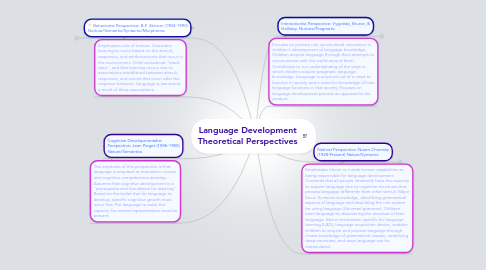Language Development Theoretical Perspectives
by Kimberly Dandelske


1. The emphasis of this perspective is that language is acquired as maturation occurs and cognitive competencies develop. Assumes that cognitive development is a "prerequisite and foundation for learning". Based on the belief that for language to develop, specific cognitive growth must occur first. For language to exist; the capacity for mental representation must be present.
2. Emphasizes role of nurture. Considers learning to occur based on the stimuli, responses, and reinforcements that occur in the environment. Child considered "blank slate", and that learning occurs due to associations established between stimuli, responses, and events that occur after the response behavior. Language is learned as a result of these associations.
3. Behaviorist Perspective: B.F. Skinner (1904-1990) Nurture/Semantic/Syntactic/Morphemic
3.1. Check out http://www.mindmeister.com/tools
4. Cognitive Developmentalist Perspective: Jean Piaget (1896-1980) Nature/Semantics
5. Emphasizes inborn or innate human capabilities as being responsible for language development. Contends that all people inherently have the capacity to acquire language due to cognitive structures that process language differently from other stimuli. Major focus: Syntactic knowledge, identifying grammatical aspects of language and describing the rule system for using language (Universal grammar). Children learn language by discovering the structure of their language. Inborn mechanism specific for language learning (LAD), language acquisition device, enables children to acquire and process language through innate knowledge of grammatical classes, underlying deep structures, and ways language can be manipulated.
6. Focuses on primary role sociocultural interaction in children's development of language knowledge. Children acquire language through their attempts to communicate with the world around them. Contributes to our understanding of the ways in which children acquire pragmatic language knowledge. Language is acquired out of a need to function in society and a need for knowledge of how language functions in that society. Focuses on language development process as opposed to the product.
7. Interactionist Perspective: Vygotsky, Bruner, & Halliday. Nurture/Pragmatic
7.1. We hope you'll have fun with MindMeister ...
7.2. Get started now!
7.3. ... and some great ideas too!
8. Nativist Perspective: Noam Chomsky (1928-Present) Nature/Syntactic
8.1. Use toolbar to add ideas
8.2. Key shortcuts
8.2.1. INS to insert (Windows)
8.2.2. TAB to insert (Mac OS)
8.2.3. ENTER to add siblings
8.2.4. DEL to delete
8.2.5. Press F1 to see all key shortcuts
8.3. Drag & Drop and double-click canvas
8.4. Find out more?
8.4.1. Online Help
8.4.2. Use Cases & Templates
8.4.2.1. Personal Todo List
8.4.2.2. Vacation Planning
8.4.2.3. Meeting Minutes
8.4.2.4. Project Plan
8.4.2.5. more...
8.4.3. Tools and Gadgets
8.4.3.1. Offline Mode
8.4.3.2. Geistesblitz Tools
8.4.3.3. Email & SMS Gateways
8.4.3.4. Offline Mode
